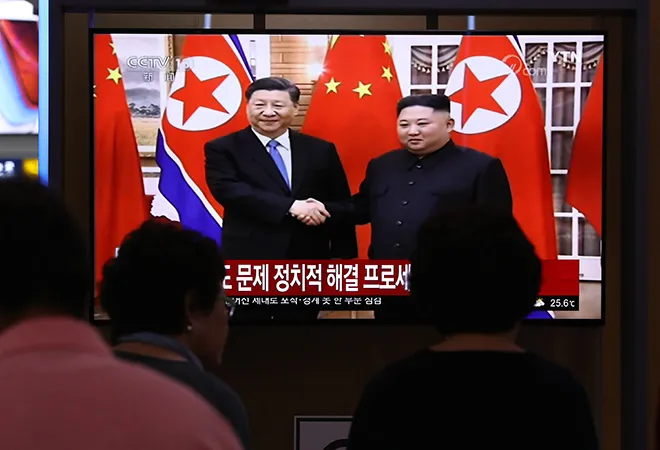 This is the 82nd article in the series
This is the 82nd article in the series The China Chronicles.
Read the articles here.
The People’s Republic of China (PRC) is considered as the Democratic People’s Republic of North Korea (DPRK) or North Korea's closest ally. Beijing and Pyongyang established their diplomatic relations just before the outbreak of the Korean War, with the Chinese Communist Party Chairman Mao Zedong meeting with North Korea’s supreme leader Kim Il-sung in Beijing in May 1950 and the PRC assisting North Korea in a period of war and great unrest. China’s President Xi Jingping’s recent visit to Pyongyang to meet with North Korean leader Kim Jong-un, marked the first state visit from Beijing to Pyongyang in 14 years. Notably, this is the fifth meeting between the two leaders in the last 15 months — but the first in North Korea. However, close watchers of the relationship argue that this meeting has displayed limited significance in the improvement of the relationship between the two countries. The year 2019 also marks 70 years since the establishment of diplomatic relations between the two PRC and the DPRK.
As North Korea’s largest trading partner, PRC has primarily focused on increasing the economic accountability and regional stability with Kim Jong-un’s government and the region as a whole. In comparison, the focus of the United States has been on the de-nuclearisation of the Korean peninsula. More recently, although the PRC has maintained its military and economic assistance to North Korea, there has been a shrinkage in the strength of the alliance. The PRC distanced its support over the years, with the first strains emerging in light of North Korea’s 2006 nuclear weapons test. China supported the 2017 UN sanctions for the missile test conducted by Pyongyang. From the North Korean side, Kim has been systematically trying to lift the economy and reduce the country’s dependence on external support. In an effort to reinforce China’s political influence in North Korea, the past couple of years has been marked with a number of diplomatic interactions and visits between the leaders and other officials of the two countries. North Korea’s economy has been struggling due to international sanctions and although China supported these sanctions, the government suggested that it was willing to provide some relief in exchange for de-nuclearisation. Despite the sanctions and the drop in trade between the two, informal trade has been thriving which suggests the softening of the PRC’s stance towards Pyongyang. The lack of China’s economic support would be detrimental to Beijing’s desire to assert its influence in the region and therefore, it is in the PRC’s best interest to recognise the importance of North Korea in its regional strategy. More recently- the interactions between the Kim regime and the Trump Administration have also precipitated a change in PRC’s approach to North Korea.
As North Korea’s largest trading partner, PRC has primarily focused on increasing the economic accountability and regional stability with Kim Jong-un’s government and the region as a whole.
Over the years, the nature and depth of the Sino-North Korean relationship has been a key factor in influencing the US policy towards North Korea. On the other hand, Washington’s engagement with North Korea also reveals changes in the relationship between the PRC and North Korea. Pyongyang and Beijing face unique challenges with the US, which has resulted in divergent bilateral engagements and negotiations with the superpower. For China, North Korea provides the opportunity to leverage its national interests in its engagement with the US. In order to maximise China’s presence in North Korea, Beijing is exploring economic opportunities that North Korea is seeking. In tandem with Kim’s nuclear ambitions, the potential improvement in North Korea’s economic interactions with the PRC will solidify the reign of Kim Jong-un’s regime. He needs support from China for the overall advancement of the country, but also in case no benefits emerge from the bilateral negotiations with the US. It is well-known that there is underlying tension between the leaders of the PRC and North Korea, but severing the alliance between the two would be more detrimental than beneficial. Both countries have independent issues with the US, but their leverage vis-à-vis the US is predicated upon the strength of their alliance. For China, a diminution of its influence over the Korean Peninsula would have ruinous effects on its national interests. Although there is uncertainty about level of Chinese influence over North Korea, the series of high-level interactions between the two countries suggests a boost in the relationship and reveals the extent to which China accords importance to the Korean Peninsula and its ties with Pyongyang.
It is well-known that there is underlying tension between the leaders of the PRC and North Korea, but severing the alliance between the two would be more detrimental than beneficial. Both countries have independent issues with the US, but their leverage vis-à-vis the US is predicated upon the strength of their alliance.
The PRC is attempting to use its influence in North Korea as a bargaining chip to assert its authority both in the region and in its negotiations with the United States. By improving relations with North Korea, Xi can project China’s regional hegemony, continue North Korea’s dependence on China and sway Kim to look towards Beijing for economic development. A closer relationship with Pyongyang will demonstrate the PRC’s ability to also act as a mediator in the de-nuclearisation of the Korean Peninsula with the US and the international community. Steady cooperation between Beijing and Pyongyang will help them realise their national and international interests. In the future, China is likely to tread carefully in the case of North Korea in order to ensure the balance of power remains intact and more optimistically shifts to its advantage regionally and increases Beijing leverage vis-a-vis the US.
The views expressed above belong to the author(s). ORF research and analyses now available on Telegram! Click here to access our curated content — blogs, longforms and interviews.



 This is the 82nd article in the series The China Chronicles.
Read the articles
This is the 82nd article in the series The China Chronicles.
Read the articles  PREV
PREV


